What awaits the graduating Class of 2022 as they enter the workforce? The recent easing of COVID-19 safe management measures (SMMs) and reopening of borders suggest that, on some level, a sense of normalcy is being restored. Employees used to working from home are now reacquainting themselves with office life. While some companies are mandating a full return to the office, others are opting for a hybrid work model that leverages video conferencing software and online collaboration tools to allow employees to work remotely part of the time.
This year’s NUS Commencement in July — which will be held in person with SMMs such as mask-wearing indoors and verification of vaccination statuses for all graduands and guests — similarly comprises a mix of old and new. Back for the first time since the pandemic began are ceremonial traditions such as the full academic procession, balloon drop and taking of class photos. “Commencement is one of the most significant milestones for students as it marks the completion of their studies,” says Mr R. Rajaram (Affiliate Alumnus ’20), NUS Registrar. “A virtual ceremony cannot offer the same experience as a physical ceremony — from wearing the graduation gown and receiving the degree scroll on stage to celebrating the occasion with fellow classmates and loved ones.”
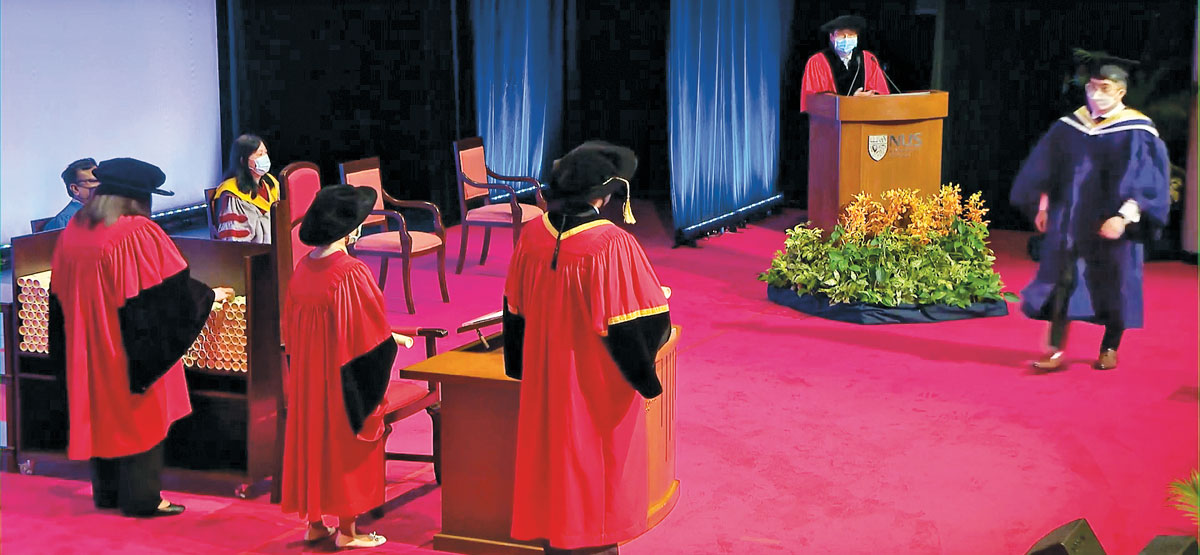 Held last October, the in-person Commencement 2021 ceremonies were livestreamed on YouTube.
Held last October, the in-person Commencement 2021 ceremonies were livestreamed on YouTube.
That said, the University is also taking a leaf from last year, when it held two Commencement ceremonies — a first-ever virtual one, followed by a pared-down physical event a few months later — for both the Classes of 2020 and 2021. Some online features will be retained, such as YouTube livestreaming of ceremonies and augmented-reality Instagram filters, to enable wider and deeper participation and engagement. For instance, students can tune in to multiple Commencement sessions live on YouTube and post congratulatory messages to friends from other courses, while relatives living abroad can also watch the e-ceremonies.
No matter the situation, one cannot refute that technology is seeping into almost every aspect of our lives. At NUS, this is evident not only in the shift to an interdisciplinary curriculum — where all undergraduates are taught concepts like data literacy and computational thinking — but also in the increasing use of educational technology (edtech) to promote blended learning and give students greater control over their own learning journeys. These changes lay the groundwork for students to develop digital know-how and adaptability, which will be invaluable once they graduate into the real world.
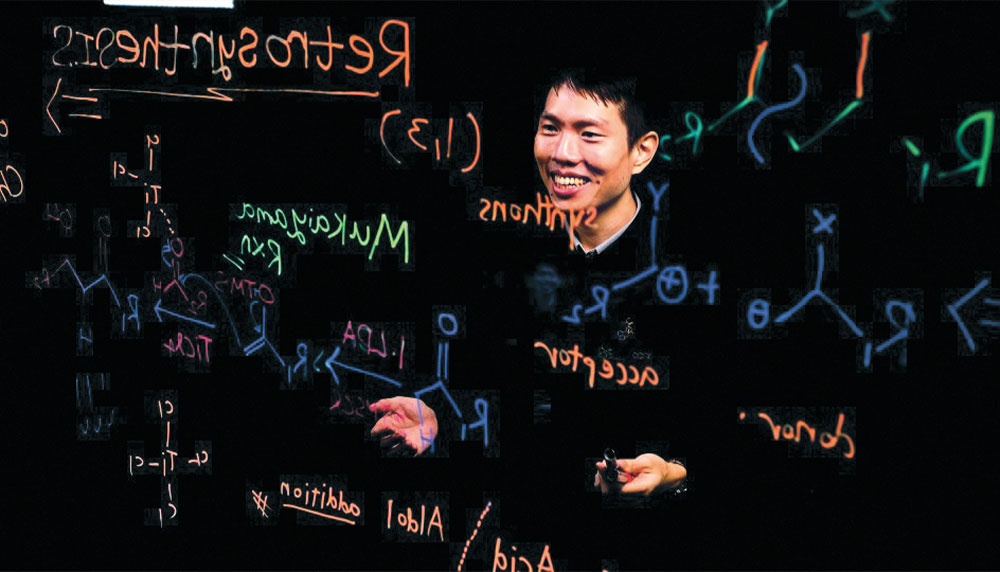 Lightboards allow presenters to write notes while facing viewers.
Lightboards allow presenters to write notes while facing viewers.
GOING ALL IN ON EDTECH
From the lockdown during the circuit-breaker period to the pendulum swings between easing and tightening of SMMs, and now to a, hopefully permanent, lifting of COVID-19 restrictions, the Classes of 2020, 2021 and 2022 have endured all the upheavals wrought by the pandemic over the last two-and-a-half years. They had to quickly adjust to home-based learning, accessing Zoom ‘live’ classes and pre-recorded lectures, and sitting for online proctored exams. As the economy gradually reopened, NUS likewise took a phased approach to resuming campus operations. Students as well as staff had to initially stay within designated zones to prevent cross-infection, and hybrid teaching meant that in-person classes were capped at 50 students with the rest joining virtually from home. Only lately have group size limits — including for co-curricular activities (CCAs) — been removed, and unvaccinated individuals are now allowed on campus if their self-swab antigen rapid test (ART) result is negative.
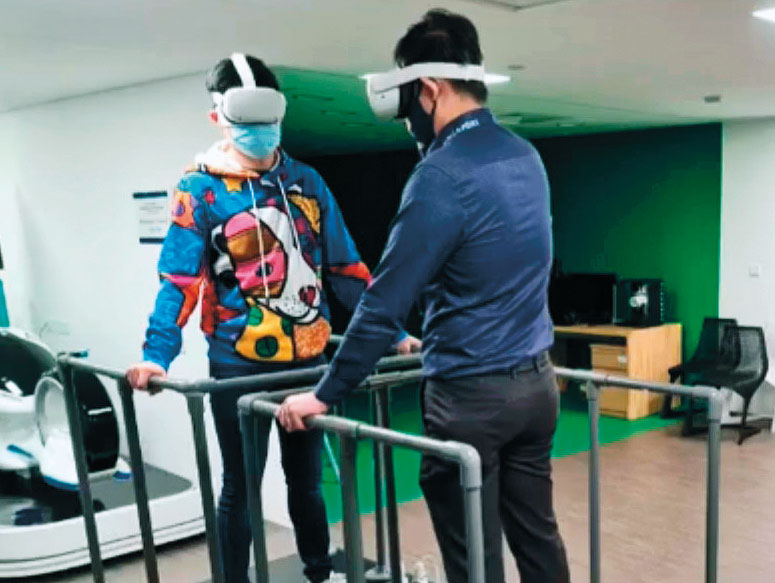 Earthquake simulation with virtual reality.
Earthquake simulation with virtual reality.
Although these changes were unprecedented, NUS had to some extent already prepared itself for such a crisis. “After the 2003 SARS epidemic, we instituted an e-Learning Week in 2008 to test our readiness in the event of another outbreak,” says Professor Bernard Tan (Science ’89), Senior Vice Provost (Undergraduate Education). Beginning with certain schools and faculties, all classes and assessments were conducted online for one week, with NUS Information Technology (NUS IT) and the Centre for Instructional Technology (CIT) providing the necessary IT infrastructure. The initiative was subsequently extended to the entire University in later years.
As such, when COVID-19 struck in 2020, the impact on teaching and learning activities was manageable. Electronic conferencing and meeting systems as well as video management platforms were already in place. Most faculty members were utilising the campus-wide learning management system LumiNUS for their modules, be it to conduct online quizzes, post class timetables or upload web lectures. Many students were also reliant on LumiNUS to keep track of their assignments and deadlines. What the pandemic did was accelerate the adoption of these technologies among the NUS community.
NUS’ e-learning needs have since stretched way beyond one week, and CIT’s work has concomitantly grown manifold. While university campuses around the world stayed closed, CIT partnered Massive Open Online Course (MOOC) providers such as Coursera and edX to give NUS students free access to MOOCs and encourage remote learning. Then, in anticipation of students’ phased return to campus, CIT had to quickly scale the retrofitting and conversion of existing classrooms into hybrid-ready mode. The Centre procured webcams, speaker phones, visualisers and writing tablets for loan to teaching staff. It also set up self-recording studios and a lightboard room, equipped with digital and audio-visual technologies, for the recording of lectures. With CIT’s assistance, faculty members became bolder in jazzing up presentation slides with 360° videos, animations, voice-overs and other elements to make their lectures more interesting and engaging.
![]()
Edtech is an important supplement to enhance traditional teaching and learning processes. It provides students with easy-to-access information, accelerated learning, and fun opportunities to practise what they learn. It also deepens their understanding of the subject matter being taught.
Mr Ong Chin Hwa, Director, Centre for Instructional Technology, NUS
Other projects spearheaded by CIT include Blended Learning 2.0 and geNiUSworld, both of which were introduced to improve student learning outcomes. Under the former, opportunities to design (or redesign) modules and courses through the flexible and meaningful integration of face-to-face and online instruction are being explored. For example, large lectures involving the one-way dissemination of knowledge (from lecturer to students) could possibly migrate online, while tutorials and labs — where small-group discussions and hands-on learning happen — would remain face-to-face. geNiUSworld is an online repository of multimedia-enhanced e-books and educational videos created by — and shared with — NUS staff and students, thus promoting professional development and peer learning.
Indeed, the University is not merely dabbling in tech-enhanced learning as a temporary solution to COVID-related challenges; it has a more ambitious goal in mind. “COVID-19 has established the fact that the hybrid model is here to stay,” says Mr Ong Chin Hwa (Computing ’91), Director of CIT. “Edtech is an important supplement to enhance traditional teaching and learning processes. It provides students with easy-to-access information, accelerated learning, and fun opportunities to practise what they learn. It also deepens their understanding of the subject matter being taught.”
Out of all the buzzy new edtech tools being piloted at NUS, extended reality might just have the most transformative potential. The Department of Geography recently began using virtual reality (VR) headsets together with a vibrating platform to simulate earthquake scenarios and let students experience what an earthquake feels like. At the Yong Loo Lin School of Medicine (NUS Medicine), those unable to complete clinical postings in 2020 due to COVID-19 restrictions were able to still immerse themselves in an operating theatre scenario through a VR game that taught patient safety and effective communication with healthcare professionals. NUS Medicine is now going one step further with a new mixed-reality technology that merges the real and virtual worlds. Using actual tools, medical and nursing students get to practise inserting urinary catheters and intravenous tubes in patients, while being guided by 3D holograms projected from their headsets.
BRING IT ON!
Ms Sharlyn Ng (Nursing + Arts and Social Sciences ’21) and Mr Vincent Cai (Public Health ’21) certainly had an eventful period while studying at NUS. Despite the disruptions, these young alumni made the most of the opportunity in their own ways.
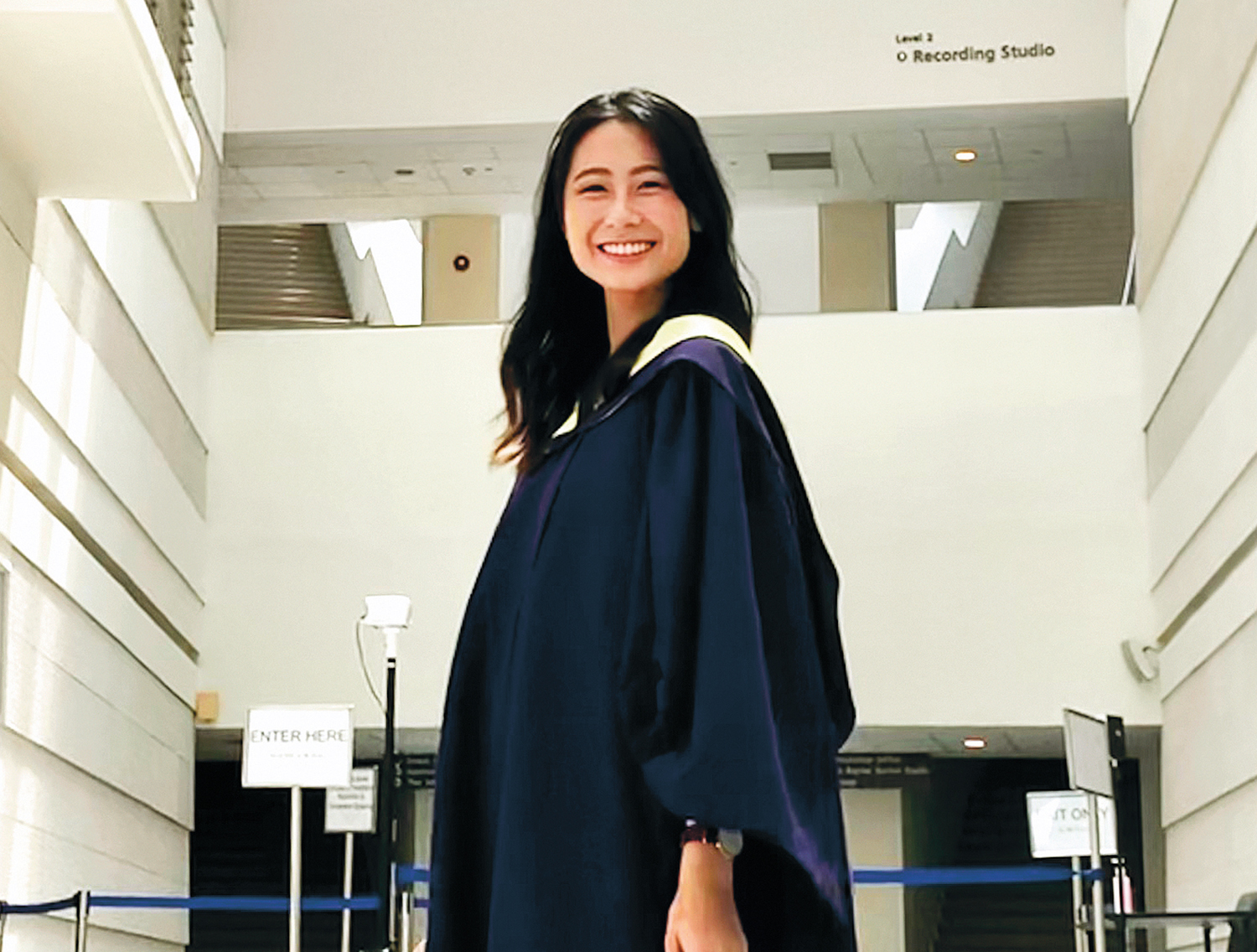
Ms Sharlyn Ng, 24, a registered nurse at NUH
“I was in the third year of my Nursing degree when COVID-19 hit in early 2020. At the time, I had been preparing to minor in Economics and was taking one Economics module that semester while attached to the National University Hospital (NUH). It was very tiring to have to constantly travel between NUS for my Economics classes and NUH for my afternoon shifts, so the move from physical to online classes made things easier for me, especially once my attachment resumed halfway through the semester.
In my final year, I decided to switch my Economics minor to a major, as I could squeeze in more classes now that everything was online. Aside from learning to cope with Zoom fatigue and getting used to studying alone at home, I didn’t have much difficulty adjusting to online classes. I appreciated the fact that I could catch up on Zoom lectures and rewatch recorded tutorials at twice the speed to facilitate my learning, sometimes while on my way to NUH or during breaks when on shift.
I attended both the online and physical Commencement ceremonies in 2021. The latter was more meaningful, as I had not seen many of my fellow batchmates and friends in person since physical classes stopped the year before. Most of us had already started working as well. It was a rare chance for us all to be together in one place, given the restrictions on social gatherings then.”

Mr Vincent Cai, 32, a Public Health Officer at MOH
“I started working at the Ministry of Health’s (MOH) Communicable Diseases Division in late 2019, while pursuing my part-time Master of Public Health degree. My primary job scope was the surveillance, epidemiology and response for droplet-borne diseases such as measles and rubella. But shortly after that, I was redeployed to MOH’s COVID-19 Contact Tracing Task Group (now called the Contact Tracing and Epidemiology Centre).
The pandemic went through numerous phases and changes; it felt like we were dealing with a new virus at each phase. For me, it was an eye-opening experience to witness the emergence of a new pathogen and how the world mobilised to respond to this threat. It made me realise the importance of leadership and clear objectives in balancing multiple goals in an environment that is constantly evolving. Now back in my original job scope, I have expanded into a few other diseases and still assist occasionally with COVID-related matters.
NUS exposes students to a broad worldview and encourages innovation to address future needs. I would advise new graduates to be brave, step out of your comfort zone and take on challenges that stretch your capabilities. You would be surprised by how much we often underestimate our own ability to adapt and grow.”
ACROSS THE uNivUS
The growing applications of VR, alongside other edtech tools, in NUS’ curricula are a clear indication that the University is well on its way to becoming a ‘Smart, Safe and Sustainable’ (S3) campus. “With the pandemic, there has been a greater slant on the safety aspect,” says Ms Tan Shui-Min (Computing ’91 + Business ’02), Chief Information Technology Officer at NUS. “We have introduced many solutions to promote safety and also ensure a good user experience.” Chief among these is uNivUS — a one-stop mobile app unveiled in April 2020 that connects users to key NUS services and resources, including adherence to SMMs on campus.
![]()
Timing offered uNivUS the perfect opportunity to become the de facto mobile platform for the University.
Mr Roy Tan, Director, Organisational Excellence Transformation Unit, NUS
Short for ‘Uniting NUS Individuals’, uNivUS was conceived in 2019 to integrate all the disparate NUS apps into a single platform for better convenience and efficiency. As the pandemic unfolded, NUS IT — in collaboration with the Organisational Excellence Transformation Unit (OETU), within the Office of the President — pivoted quickly and developed new features to support SMMs ahead of the app’s launch. The first version of uNivUS was used primarily for daily temperature declaration and access to campus facilities. Subsequent features included (1) overseas travel declaration, (2) visitor registration, (3) uploading a picture of ART results, with an artificial intelligence (AI) engine that suggests the test result, (4) NUSafe, which notified users if they had crossed zones on campus (until zoning restrictions were lifted in December 2020) and alerts those who have been in close proximity with infected individuals, (5) NextBus Widget, which monitors the arrival times of buses on campus, (6) Crowd Insight, which provides visibility to crowd levels at NUS canteens and libraries, (7) a calendar to keep track of upcoming classes and exams, as well as (8) links to frequently-used NUS services and informational resources.

APP-SOLUTELY!
To date,uNivUS has:
- Onboarded more than 82,000 users
- Been “Highly Commended” in the Gartner Eye on Innovation Awards for Higher Education 2021
- Appeared as a finalist in the ‘Technological or Digital Innovation of the Year’ category at the Times Higher Education Awards Asia 2021
- Received the OpenGov Asia Recognition of Excellence Award 2022 for “being at the forefront of digital transport to improve the quality of service to staff and students”
“Timing offered uNivUS the perfect opportunity to become the de facto mobile platform for the University,” says OETU’s Director, Mr Roy Tan (Business ’15). Another factor behind its successful roll-out is the emphasis on student engagement, he adds. “We want a successful app for students, by students. It’s best to collaborate with students to design an app that is both well-received and functional. We do so through channels such as the Telegram student community, engaging student designers and consulting with interns at NUS IT.”
Right from the outset, student volunteers were invited to join the project team, where they contributed ideas and gave feedback on early prototypes of uNivUS. Its new-look user interface, refreshed last year, was based largely on their design inputs. Their suggestions were also incorporated into the latest version of uNivUS, released in April 2022. Users can now choose a Dark Mode option to reduce glare and extend the battery life of their smartphones, or scroll through an Inbox Feed to keep up with campus happenings and bookmark their favourite news.
Ms Tan notes that plans are underway to extend the app to NUS alumni as well. “Beyond the pandemic, we envision uNivUS as a smart personal digital assistant that will serve as the single point of entry to all NUS digital services for everybody related to NUS: students, staff and alumni,” she explains. “It will morph and evolve according to each individual’s journey with the University. For example, it could nudge students who have omitted a video that their lecturer has asked them to watch, or recommend to alumni lifelong learning opportunities relevant to their careers.”
READY FOR THE FUTURE
Notwithstanding its current focus on safety, NUS has not been lying idle in the other S3 dimensions either. The intended customisation of uNivUS to users’ individual profiles is one example of smart, user-friendly technologies that the University aims to develop. In more groundbreaking news, NUS embarked on a partnership with StarHub early this year to provide outdoor WiFi on campus using 5G as the backhaul, which complements NUS’ existing indoor campus wireless network.
The beauty of this solution is twofold, Ms Tan explains. Using 5G (instead of fibre optic cables) as a conduit removes the need for excavation work and laying of underground pipes, which in turn shaves years off the implementation and lowers construction costs. It is also Singapore’s first 100% solar-powered campus WiFi, thus delivering on the sustainability agenda to boot.
With the increased wireless capacity and high-speed connectivity accorded by 5G, the stage is set for NUS to test all kinds of Internet of Things (IoT) applications. Various smart innovations are being tested to see whether they can improve campus facilities management. For instance, security robots and drones are patrolling the campus to detect suspicious objects or activities. Sanitary sensors have also been installed in toilets to monitor variables such as ammonia and occupancy levels, as well as water and soap consumption, to enable a quicker response for cleaning and maintenance work.
![]()
When our students graduate, their experience at NUS will help them bring that same S3 awareness into society.
Ms Tan Shui-Min, Chief Information Technology Officer, NUS
At present, 5G network coverage and IoT devices are being deployed within NUS University Town (UTown) as part of a two-year trial. The next step is to roll these out campus-wide, which will hopefully enhance productivity, efficiency and safety. On a related note, NUS’ smart campus initiatives are also closely linked to sustainability. Ms Tan shares that work is ongoing to keep the NUS Data Centre a green one, for example, by deploying energy-efficient cooling technologies. In addition, moving further into the extended-reality space and offering more virtual or immersive lessons would lead to less dependence on physical space and resources like paper. “So, when our students graduate, their experience at NUS will help them bring that same S3 awareness into society,” says Ms Tan.
NUS’ digital transformation is picking up steam in other areas too. A major player on the scene is the Centre for Future-ready Graduates (CFG), whose suite of tech tools and resources is designed to help students as well as alumni achieve career success. With its 24/7 virtual career assistant VMock — which utilises AI, machine learning and a sophisticated analytics engine — they can get instant and personalised feedback to improve their resumes and video interview skills. There is also NUS career+, a mobile app that builds a personalised skills profile for users and provides matching job openings. Other newer digital platforms by CFG include Internship-As-A-Service (IAAS) and conNectUS, both launched in January 2022 to prepare students for the working world.
![]()
conNectUS is a safe and convenient avenue to exchange ideas, thoughts and advice. Through the platform, alumni like me can easily stay connected to our alma mater and pay it forward to juniors. I’ve also reached out to other NUS alumni on the forums for advice on my own career decisions.
Mr Charles Lee, Associate Product Manager, YouTrip
 11,000 users (alumni and students) are on conNectUS
11,000 users (alumni and students) are on conNectUS
IAAS has attracted >1,500 students and >140 companies who have posted >600 gigs and flexible internships
*Latest statistics from CFG as of 29 April 2022.
An exclusive professional networking platform for the NUS community, conNectUS brings together alumni and students through features such as a people directory, live feeds and forums, an event calendar and job listings. Alumni get to expand their professional networks and enhance their job search or recruitment activities, while students can plug into the wide and diverse alumni pool for mentorship. One early adopter is Mr Charles Lee (Engineering ’21), now an Associate Product Manager at local fintech start-up YouTrip. Not long after signing up with conNectUS, he was contacted by final-year Geography major Mr Joel Ng (Arts and Social Sciences ’22), who wanted to break into product management and sought out Mr Lee for career advice. “Given that I had only been in the industry for a year, I saw Joel as more of a peer than a mentee. Both of us had interesting insights to learn from one another. I told him about my experience at my first job as well as my considerations when it came to selecting it, while he shared with me the interview questions that tech recruiters had asked him. It was a mutually beneficial relationship where we both wanted to help the other grow,” says Mr Lee, 26. “conNectUS is a safe and convenient avenue to exchange ideas, thoughts and advice. Through the platform, alumni like me can easily stay connected to our alma mater and pay it forward to juniors. I’ve also reached out to other NUS alumni on the forums for advice on my own career decisions.”
Similarly, IAAS is a gig marketplace that provides NUS students with the chance to land gigs and internships with a diverse range of companies — local or foreign, large or small, within or outside their degree specialisation. Students thus have a wealth of opportunities to gain hands-on work experience, unbounded by the academic calendar, while employers on their part can tap on this talent pool for skilled services.
DID YOU KNOW?
SkillsFuture Singapore has identified three key growth pillars with exciting career opportunities. As luck would have it, these three areas loosely mirror NUS’ S3 campus strategy:
 1. Digital economy
1. Digital economy
Tech-heavy roles requiring data engineering, IoT management and other digital skills will take precedence as we enter the Fourth Industrial Revolution (Industry 4.0).
 2. Green economy
2. Green economy
Workers familiar with green process design, carbon footprint management, and environmental frameworks and policies will be needed to combat climate change and achieve sustainability.
 3. Care economy
3. Care economy
Driven largely by our ageing population, care professionals who demonstrate ethical conduct, effective stakeholder management and inclusive practices will be in high demand.
For Mr Chen Yao (Engineering ’22), who joined IAAS’ pilot phase prior to its official launch, the flexibility offered by the platform was the best part. “I had previously interned at engineering and tech companies, but using IAAS allowed me to explore other industries,” says Mr Chen, 25. “What caught my interest was the opportunity to take on bite-sized projects during semester time, with flexible arrangements, while concurrently working on my final-year project.” The Mechanical Engineering major secured a three-month internship at a family business in the finance industry, where he assisted colleagues in analysing and identifying fintech projects with growth potential and then generating an investor report. “Through the experience, I interacted with people from different backgrounds and broadened my spectrum,” he shares. “It allowed me to develop interdisciplinary knowledge and skills, and become more adaptable in various situations and environments. This is very important in today’s world."
![]()
We deliberately show how problems can be more thoroughly understood when viewed from multiple disciplinary lenses, and how effective solutions can be conceived by combining knowledge from various disciplines.
Professor Bernard Tan, Senior Vice Provost (Undergraduate Education), NUS
THE CALL FOR INTERDISCIPLINARITY
Much has been said and written lately about NUS’ shift to interdisciplinary education. The University made a big splash in December 2020 with its formation of the College of Humanities and Sciences (CHS), an enhanced undergraduate experience that encourages students from the Faculty of Arts and Social Sciences and the Faculty of Science to break out of their respective silos. This was followed by the College of Design and Engineering (CDE), which merged the Faculty of Engineering and the School of Design and Environment. The newest entrant, NUS College (NUSC), incorporates best practices from Yale-NUS College and the University Scholars Programme. Open to students applying for almost all undergraduate programmes at NUS, NUSC will admit its first intake in Academic Year 2022/23.
During a radio interview with CNA938 earlier this year, NUS’ Senior Vice Provost (Undergraduate Education) Professor Bernard Tan spoke about the value of these educational reforms. “In an increasingly complex and fast-changing world, our graduates working in many industries will be confronted with problems that cannot be thoroughly understood when viewed from any one discipline,” he argued. An interdisciplinary education is therefore vital to prepare them for the working world. This, he stressed, means not just letting students take courses from multiple disciplines, but also emphasising the interface and interplay between them. “We deliberately show how problems can be more thoroughly understood when viewed from multiple disciplinary lenses, and how effective solutions can be conceived by combining knowledge from various disciplines,” said Prof Tan.
Careful thought went into designing the curriculum structure and content of CHS, CDE and NUSC. While students are free to pursue intellectual breadth or depth based on their interests, all three colleges ensure a firm grounding in 21st-century competencies through foundational or common modules. Technology is obviously a key theme within this foundational layer, with modules centred on data literacy, digital literacy, AI and computational problem-solving, among others. “In the coming decades, every industry will be continuously transformed by advances in technology which will allow work to be carried out in new ways,” Prof Tan added in his radio interview. Reforming the curriculum along these lines will enable graduates to adapt to these changes and become what he termed “drivers of industry transformation”.
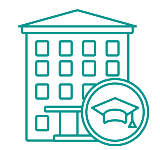
LIVE IT UP!
Even the hostel experience is being reimagined as part of NUS’ holistic, interdisciplinary approach to learning — starting this August, the University is expanding its student housing options. Apart from the six Halls of Residence (built on rich heritage and strong CCA involvement) and four Residential Colleges (with thematic academic programmes):
Two new Houses, Pioneer House and LightHouse, will open. With reduced CCA requirements and no meal plan, this concept instead emphasises peer mentoring, small-group engagement and collaborative leadership.
The two existing Student Residences, which offer no-frills accommodation, will see the introduction of Masters and Residential Fellows. Students will thus benefit from enhanced on-site pastoral care and wellness support.
“Regardless of which housing model students choose, each type provides an enriching residential experience that extends the platform for holistic education,” says Associate Professor Ho Han Kiat (Science ’00), NUS’ Dean of Students. “Specifically, residential living widens students’ appreciation of the community, helping them grow into responsible and constructive members of society, global citizens, and leaders of change for tomorrow.”
LEARNING NEVER ENDS
So, back to the central question: What awaits the graduating Class of 2022 as they enter the workforce? There is a lot of uncertainty, but one thing’s for sure — graduates must possess the skills to live and operate in a technology-led world. Becoming comfortable with technology is a key takeaway from their NUS education — whether that translates into online proficiency to facilitate remote work and improve productivity, the ability to analyse and interpret data to support decisions and objectives, or a knack for synthesising tech-related and other knowledge to invent radical new ideas.
However, no matter how much learning is packed into one’s undergraduate years, it is impossible to impart everything that a person would need to know over the course of their lifetime. Professor Susanna Leong (Law ’89), Vice Provost (Masters’ Programmes & Lifelong Education) and Dean of the School of Continuing and Lifelong Education (SCALE), elaborates: “Singapore’s transformation into a Smart Nation will bring greater convenience and accessibility of modern services, but we will also face more complex societal challenges. The rapid advancement in digitalisation, in combination with other powerful global forces, is making our work and social environment more volatile, uncertain, complex and ambiguous (VUCA), shortening the half-life of knowledge. Alumni who want to thrive in the future economy need to be adaptable and agile, and embrace interdisciplinary and lifelong learning.”
![]()
The rapid advancement in digitalisation, in combination with other powerful global forces, is making our work and social environment more volatile, uncertain, complex and ambiguous (VUCA), shortening the half-life of knowledge. Alumni who want to thrive in the future economy need to be adaptable and agile, and embrace interdisciplinary and lifelong learning.
Professor Susanna Leong, Vice Provost (Masters’ Programmes & Lifelong Education), Dean (School of Continuing and Lifelong Education), NUS
At NUS, the demand for — and provision of — digital and tech courses has increased over the last three years. Existing short and modular courses such as those in Robotic Process Automation and Software Development, as well as master’s programmes in Business Analytics and Industry 4.0, now offer more places. New degree programmes and courses have been rolled out for topics like Biomedical Informatics, Maritime Technology and Management, Green FinTech, and Natural Language Processing. Outside of these efforts, NUS (through SCALE) is also co-managing the Singapore 5G & Telecoms Academy (5G Academy) with Singapore Polytechnic. Established under the auspices of the Infocomm Media Development Authority (IMDA) in November 2020, the 5G Academy aims to develop 5G-ready talent and encourage upskilling in preparation for the coming 5G wave.

THE 5G ACADEMY: QUICK FACTS
As of October 2021, more than 5,500 people had received training in 5G and related technologies
More than 700 5G-related short courses and academic programmes are currently on offer by various institutions across Singapore
IMDA plans to roll out 5G coverage nationwide by 2025
Take 36-year-old Ms Naweera Binte Sidik (Design and Environment ’10), an architect-turned-user experience (UX) designer for example. In March 2021, she went back to school to pursue the NUS SGUnited Skills Programme in International Financial Technology for non-Technical Executives, a nine-month programme offered by NUS and conducted online. “Through the course, I picked up hard tech skills that allow me to communicate better with web and app developers, and design user flows that link to back-end processes more efficiently. I’m also using what we learnt about Agile and Iterative Design in the work I do for clients,” says Ms Naweera. “On a personal note, the module on Algo-trading helped me understand the importance of investing and how to do it in a safe and balanced way.”
![]()
I had a great time as a student, and it’s good to know we can always go back to extend our learning and broaden our perspectives.
Ms Naweera Binte Sidik, architect-turned-UX designer
Even though the concept of lifelong learning had yet to take off when she was an undergraduate student, Ms Naweera is now firmly in that camp. “NUS’ efforts to encourage lifelong learning among its alumni community are motivating. I had a great time as a student, and it’s good to know we can always go back to extend our learning and broaden our perspectives,” she says. In that sense, technology can be considered both cause and effect. On the one hand, advancements in tech are precisely why so many workers need to upskill and reskill themselves. On the other hand, the rise of remote learning and short online courses makes it easier than ever to grab these lifelong learning opportunities.
Within this space, digital natives who grew up in the information age and started using digital devices since childhood — including the Class of 2022 — hold a distinct advantage compared to mid-career or mature professionals. As Prof Bernard Tan tells The AlumNUS, “Today’s graduates will face disruption not once but several times throughout their careers. They will need to upskill themselves to avoid becoming unemployed or underemployed. Having been exposed to tech-enhanced education as students, especially in COVID times, they will be more accustomed to this mode of learning in the longer term and will therefore have less obstacles hindering them from engaging in lifelong learning.”
CHART YOUR OWN PATH
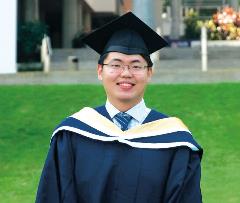 A digital native, Mr Chen Pinzhang (Engineering ’21) found his feet in technopreneurship while studying at NUS, thanks to its novel Design-Your-Own-Module (DYOM) initiative. The 26-year-old is also the founding Chairperson of NUS Alumni Ventures (NAV), the first alumni-led angel investment network in Southeast Asia.
A digital native, Mr Chen Pinzhang (Engineering ’21) found his feet in technopreneurship while studying at NUS, thanks to its novel Design-Your-Own-Module (DYOM) initiative. The 26-year-old is also the founding Chairperson of NUS Alumni Ventures (NAV), the first alumni-led angel investment network in Southeast Asia.
“In 2019 — when I was serving as the President of NUS Entrepreneurship Society (NES) — we designed and launched NES Startathon under the DYOM framework. NES Startathon is a year-long module that guides aspiring student-entrepreneurs to create their own start-ups, from ideation and validation to early-stage commercialisation. As part of the module’s pilot batch, I formed a team with two other students and fellow gamers, and that was how our hardware gaming start-up WRAEK came about.
It was also during my tenure as NES President that I noticed how difficult it was for student-entrepreneurs to gain access to angel investors. So, together with other like-minded students and alumni, we set up NAV in 2020. We now have about 80 NUS alumni angel investors on board our network. Three start-ups have successfully obtained funding so far, and we’ve also matched more than 30 start-ups with mentors. Recently, with the relaxation of SMMs, NAV held its first-ever physical Demo Day & Networking Dinner, after five online runs over the past two years. It was great for students to finally be able to meet, and pitch their start-ups to, potential angel investors in person.
What I’ve learned from these experiences is that being a self-motivated, independent learner will help greatly in the workplace. COVID-19 has, in a way, accelerated this pace. Due to remote learning, students were forced to be responsible for their own learning and self-study using online tools. In my case, I’ve taken two Coursera courses since leaving NUS — one on protecting business innovations via patents, and the other on programming IoT devices. I’m also interested in accounting and currently juggling my work at WRAEK with an online master’s degree programme in accountancy.”